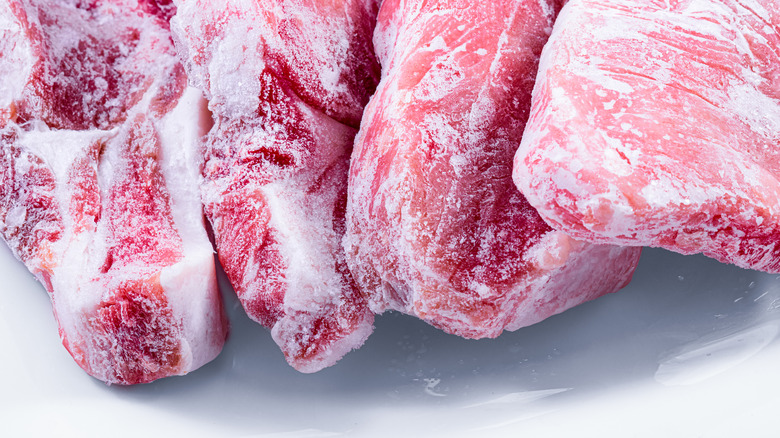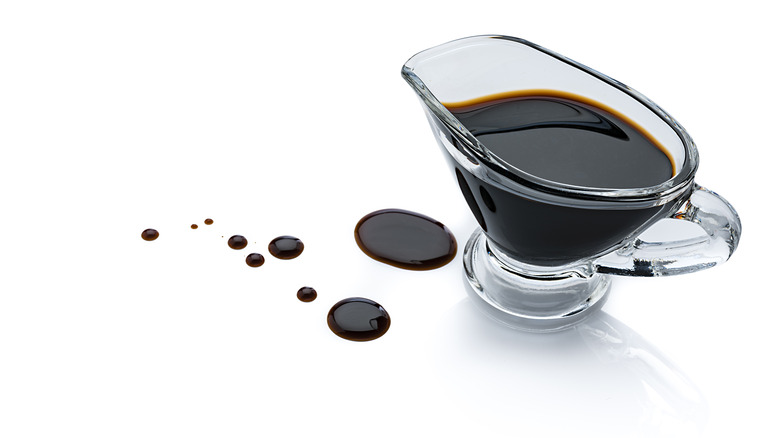The Trick To Tenderizing Meat After It's Been Frozen
Flavor is just one aspect of the dining experience. When we're talking about meat, tenderness is just as vital. Countless methods have been developed for the sake of tenderizing meat, from dry aging to cutting against the grain. Each of these techniques has its virtues, but things get trickier when you're dealing with frozen meat. If you buy meat in bulk, you can save significant money, but you'll also end up with more excess than you can probably consume (unless you want to eat steak every day for a week straight, in which case, you do you). With extra on your hands, you're bound to turn to the freezer for long-term storage.
Freezing meat might sound like a no-no to some, given the "fresh, never frozen" motto we hear so many restaurant chains throw about. But the truth is, it's perfectly fine to do, as long as you take some precautions. If you protect the meat from freezer burn by using a vacuum bag or at least squeezing as much air out of a Ziplock as you can and freezing it at a low temperature, it should hold up for as long as six months.
When it comes time to cook that meat, you'll need to thaw it. But you can make the most of this time by simultaneously tenderizing the meat. A great trick to accomplish this is adding a splash of mild vinegar to the bag. Vinegar is an excellent tenderizer, as long as you use it carefully.
How vinegar tenderizes meat
The process of tenderizing meat is all about breaking down muscle fibers and connective tissue, namely, collagen. Collagen is a highly abundant protein in animals that provides structure and strengthens muscle, bones, connective tissue, and skin. It's essential to our bodies, but its particular structure presents a problem in meat. Collagen molecules are arranged in a rigid, cross-linked pattern, which creates a tough texture. Furthermore, collagen fibrils shrink when they're cooked, causing the meat to lose moisture and grow even tougher. For tender meat, you need to break down those crosslinks. And vinegar is great at doing this.
Vinegar is acidic, and acids are capable of denaturing proteins, including collagen. It does this by unraveling the rigid structure of interwoven protein strands, which can then rearrange in a looser pattern than actually traps moisture better, keeping your meat juicy and tender.
You can use other acidic ingredients to tenderize meat, such as citrus juice or yogurt, but vinegar works fastest because it specifically contains acetic acid. Citrus contains citric acid and yogurt contains lactic acid, both of which are also produced in animal bodies. However, acetic acid is not produced by animals, meaning muscles don't naturally regulate it. This causes acetic acid to break down muscle and connective tissue at an aggressive rate. That's perfect for when you're trying to tenderize meat as it thaws, as time is usually tight in those cases, but you need to be careful. Too much vinegar can have disastrous results.
Use a small amount of vinegar
To tenderize meat as it thaws, add just a tablespoon of vinegar per pound of meat. It's a good idea to use a mild-tasting vinegar, such as balsamic, so that it won't impart a sour flavor to the finished product. You can add it to the meat while it's still frozen; then, you just need to wait until it's fully thawed.
You can regulate the thawing process by submerging the bagged meat in a bowl of cool water. Once it's completely defrosted, drain any excess vinegar and cook it to your liking. You should get a juicy, tender bite. And as long as you don't use a strong vinegar, such as white vinegar, it shouldn't spoil the flavor. In fact, using balsamic vinegar can add a nice touch of sweetness to the meat.
Still, it's essential not to add too much vinegar and to not leave the meat sitting in that acidic environment for too long after it's thawed. Once an acid starts breaking down protein structures, it doesn't stop until the meat is completely decayed. If you leave meat in contact with an acid for too long, it will become unpleasantly mushy. This is particularly true of acetic acid because it has such a strong effect on animal tissue. So keep that vinegar to a tablespoon per pound of meat, and drain it as soon as the meat has thawed.


